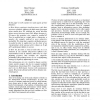Free Online Productivity Tools
i2Speak
i2Symbol
i2OCR
iTex2Img
iWeb2Print
iWeb2Shot
i2Type
iPdf2Split
iPdf2Merge
i2Bopomofo
i2Arabic
i2Style
i2Image
i2PDF
iLatex2Rtf
Sci2ools
126
click to vote
ATAL
2004
Springer
2004
Springer
Trust Dynamics: How Trust Is Influenced by Direct Experiences and by Trust Itself
In this paper we will examine two main aspects of trust dynamics: a) How direct experiences involving trust, with their successes or failures, influence the future trust of an agent about similar facts. We challenge the trivial idea that always success increases trust while failure decreases it. Of course, this primitive view cannot be avoided till Trust is modeled just as a simple index, a dimension, a number; for example reduced to mere subjective probability. We claim that a cognitive attribution process is needed in order to update trust on the basis of an ‘interpretation’ of the outcome of A’s reliance on B and of B’s performance (failure or success). b) How the fact that A trusts B and relies on it in situation Ω can actually (objectively) influence B’s trustworthiness in the Ω situation. Either trust is a selffulfilling prophecy that modifies the subjective probability of the predicted event; or it is a self-defeating strategy by negatively influencing the events....
Related Content
| Added | 30 Jun 2010 |
| Updated | 30 Jun 2010 |
| Type | Conference |
| Year | 2004 |
| Where | ATAL |
| Authors | Rino Falcone, Cristiano Castelfranchi |
Comments (0)

